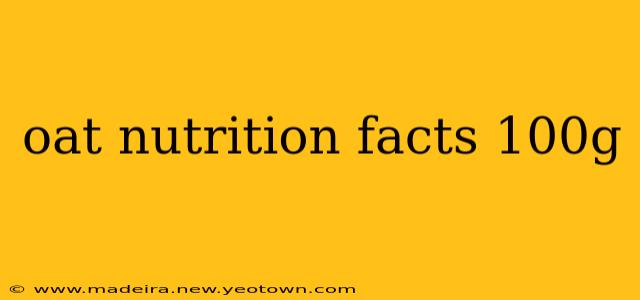Decoding the Oat: A Deep Dive into the Nutritional Powerhouse of 100g
Oats. Just the word conjures images of warm porridge on a chilly morning, or perhaps a crunchy granola bar fueling an afternoon hike. But beyond their comforting familiarity lies a nutritional powerhouse packed into those humble grains. Let's unravel the nutritional facts of 100g of oats, exploring their benefits and answering some frequently asked questions.
Imagine this: you're standing in the grocery store, facing a wall of oat options – rolled oats, steel-cut oats, quick oats, instant oats. The sheer variety can be overwhelming. But regardless of the type, the nutritional profile remains impressively consistent. Let’s delve into the nutritional powerhouse that is 100g of dry oats. Keep in mind that exact numbers may slightly vary depending on the type of oat and processing methods.
The Nutritional Profile of 100g of Dry Oats (Approximate Values):
- Calories: Roughly 389 calories
- Carbohydrates: Approximately 66g (including dietary fiber)
- Dietary Fiber: Around 10g - a significant contribution to your daily fiber intake!
- Protein: Approximately 13g – a good source of plant-based protein.
- Fat: Approximately 6.9g (mostly unsaturated fats)
- Sugar: Naturally low in sugar, typically under 1g.
This seemingly simple profile belies the impressive range of benefits packed within those 100 grams. Let's explore them in more detail.
Why Are Oats So Good For You? Unpacking the Benefits
The impressive nutritional profile translates into a range of health benefits. Oats are a fantastic source of soluble fiber, specifically beta-glucan. This type of fiber is known for its ability to lower cholesterol levels, regulate blood sugar, and promote healthy digestion. The high fiber content also contributes to feelings of fullness, making oats an excellent choice for weight management.
The protein in oats provides essential amino acids, crucial for building and repairing tissues. They are also a good source of several vitamins and minerals, including manganese, magnesium, and phosphorus.
Frequently Asked Questions about Oat Nutrition
Here, we tackle some common queries surrounding oat nutrition:
What are the different types of oats, and how do their nutritional values compare?
While the core nutritional profile remains largely similar across oat varieties (rolled, steel-cut, quick, instant), there are subtle differences. Steel-cut oats retain more of their nutritional value and fiber due to less processing. Quick and instant oats, on the other hand, are more convenient but may have slightly lower fiber content due to processing. Rolled oats offer a middle ground in terms of both convenience and nutritional density.
Are oats gluten-free?
While oats themselves are naturally gluten-free, many oat products are processed in facilities that also handle wheat, barley, and rye. This can lead to cross-contamination, making it crucial to look for certified gluten-free oats if you have celiac disease or gluten sensitivity.
How can I incorporate more oats into my diet?
The possibilities are endless! Start your day with a bowl of oatmeal, add oats to your smoothies for extra creaminess and fiber, use rolled oats in baking (muffins, cookies, etc.), or even make your own granola bars. The versatility of oats allows for easy integration into a variety of dishes.
What are the potential downsides of eating too many oats?
While oats offer numerous health benefits, consuming excessive amounts can lead to digestive issues like bloating or gas, particularly for individuals sensitive to FODMAPs (fermentable oligosaccharides, disaccharides, monosaccharides, and polyols). Moderation is key, as with any food.
Are there any interactions with medications I should be aware of?
Oats can interact with certain medications, particularly those that affect blood sugar levels. If you are on medication, it's always best to consult with your doctor or pharmacist to ensure there are no potential interactions.
In conclusion, 100g of oats offers a remarkably diverse and beneficial nutritional package. From promoting healthy digestion and heart health to providing sustained energy and essential nutrients, oats deserve a prominent place in a balanced and healthy diet. Remember to choose your oat variety based on your preferences and dietary needs, and always prioritize certified gluten-free options if you have celiac disease or gluten intolerance. Enjoy the delicious and nutritious benefits of this versatile grain!

